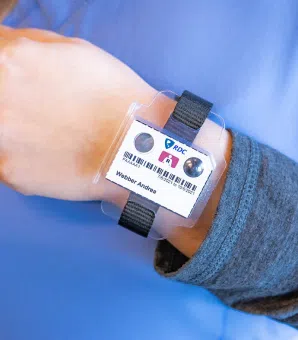
Dosimeter badge services for medical, dental, and veterinary businesses
Learn how Radiation Detection Company’s easy-to-use dosimetry solutions can boost the efficiency of your practice.
Passive dosimetry plays a major role in the safety of every radiation worker, especially high-risk employees. But what is it exactly? In this article we will take a deeper look at its importance in radiation monitoring.
We hope you find the below information helpful, and we look forward to hearing your feedback!
There are two types of dosimeters: active and passive. A passive dosimeter does not need an external source of energy to operate. They are known as integrating dosimeters, meaning they only give an estimate of a cumulative dose. Passive dosimeters record how much radiation an individual is exposed to over a specific period of time (whether it be a week, month, quarter, or year). That's so the badges can be collected and analyzed after the fact. After each wear period, a new badge is issued and used, and the old one is collected to analyze occupational dose.

Passive dosimeters are preferred in hospital settings and other locations where personnel are frequently exposed to low levels of radiation. These dosimeters are considered “passive” because they do not need to be monitored continuously.
Active dosimeters, on the other hand, measure instantaneous doses and follow the variations of radiation exposure over time. These dosimeters provide a real-time direct display of information about radiation dose for the individual wearing the device.
Optically stimulated luminescent dosimeters (OSL) and thermoluminescent dosimeters (TLD) are the two most commonly used types of passive dosimeters. While they both measure dose level, optically stimulated luminescence requires only light stimulation, while a TLD requires heat in order to stimulate the detector. The stimulation of the detector be it optical or thermal releases electrons stored in the crystal from the radiation passing through the detector. When the electrons are released luminescence or light is released.
Those who work with radioactive materials or X-ray generating devices during the course of their employment (or those who may be exposed to radiation) are normally required to carry personal dosimeters. The dosimeter must be accredited and required to demonstrate compliance with regu lations. These devices are specifically designed to measure and record the radiation dose received.
Creating and maintaining a radiation safety program is crucial in protecting radiation workers from all the elements of ionizing radiation and complying with federal and/or state regulations. Ionizing radiation includes x-rays and gamma rays (electromagnetic radiation), alpha and beta particles, and neutron radiation.
An effective radiation safety program will include personal exposure monitoring, surveys and area monitoring, radiological controls, proper training for workers, emergency procedures, accurate reporting, and internal audit procedures.
For more in-depth information on radiation monitoring best practices, please check out our recent blog titled "Radiation Safety Programs: A Comprehensive Guide."

We know that navigating dosimeter services can be complicated. That's why we provide our customers with an easy-to-use online account administration and management portal, MyRadCare™. Through MyRadCare™ you’ll be able to receive instant updates, track and order badges, find dose reports, update your pertinent account information. MyRadCare™ provides real-time access, and is designed so that customers with internet access can easily manage their accounts themselves. Account administrators can access all account details for their organization's dosimetry services.
Radiation Detection Company has 75 years of experience providing quality dosimetry service to over 28,000 companies nationwide. Want to learn more about RDC’s dosimetry options? Please visit our Solutions page to view our full suite of offerings. We offer whole body, ring, wrist, fetal monitoring, area TLD, and more.
Have a question that we did not touch on in this article? Please take a moment to reach out to our Customer Care team, and one of our specialists will be more than happy to assist you.

Learn how Radiation Detection Company’s easy-to-use dosimetry solutions can boost the efficiency of your practice.